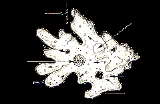
Tubulinea
Encyclopedia
The Tubulinea are a major grouping of Amoebozoa
, including most of the larger and more familiar amoebae like
Amoeba
, Arcella
, and Difflugia
.
form or produce numerous cylindrical pseudopods. Each cylinder advances by a single central stream of cytoplasm,
granular in appearance, and has no subpseudopodia. This distinguishes them from other amoeboid groups, although in
some members this is not the normal type of locomotion.
, but molecular trees by Bolivar et al. identified a core monophyletic subgroup. Subsequent studies showed the testate lobose amoebae belong to the same group, which was thus renamed Lobosea sensu stricto or Tubulinea.
Amoebozoa
The Amoebozoa are a major group of amoeboid protozoa, including the majority that move by means ofinternal cytoplasmic flow. Their pseudopodia are characteristically blunt and finger-like,...
, including most of the larger and more familiar amoebae like
Amoeba
Amoeba
Amoeba is a genus of Protozoa.History=The amoeba was first discovered by August Johann Rösel von Rosenhof in 1757. Early naturalists referred to Amoeba as the Proteus animalcule after the Greek god Proteus, who could change his shape...
, Arcella
Arcella
Arcella is a genus of testate amoebae or Arcellinida, usually found in freshwaters and mosses, and rarely in soils. A key characteristic of Arcella is the circular test with a hole on its center from where finger-like pseudopods emerge...
, and Difflugia
Difflugia
Difflugia is one of several genera of amoebozoa that produce shells or tests from granules of sand. These are swallowed by the cell and during the process of budding or fission they pass into the daughter, where they are joined by organic cement. The test has a single terminal opening. Difflugia...
.
Characteristics
During locomotion most Tubulinea have a roughly cylindricalform or produce numerous cylindrical pseudopods. Each cylinder advances by a single central stream of cytoplasm,
granular in appearance, and has no subpseudopodia. This distinguishes them from other amoeboid groups, although in
some members this is not the normal type of locomotion.
Classification
This class was anticipated by some biologists like Jahn, who grouped all amoebae with granular pseudopodia together, but most split the lobose amoebae into testate Testacealobosia and naked Gymnamoebia. The latter are polyphyleticPolyphyly
A polyphyletic group is one whose members' last common ancestor is not a member of the group.For example, the group consisting of warm-blooded animals is polyphyletic, because it contains both mammals and birds, but the most recent common ancestor of mammals and birds was cold-blooded...
, but molecular trees by Bolivar et al. identified a core monophyletic subgroup. Subsequent studies showed the testate lobose amoebae belong to the same group, which was thus renamed Lobosea sensu stricto or Tubulinea.

